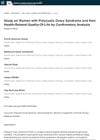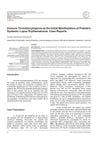
Women with PCOS often face menstrual issues, weight gain, and stress, affecting their quality of life.
 4 citations,
November 2009 in “Medical Clinics of North America”
4 citations,
November 2009 in “Medical Clinics of North America” Stress, nutritional issues, and chronic diseases can cause hair loss, and nail changes may signal internal diseases; treatment focuses on the underlying cause.
 November 2020 in “Elsevier eBooks”
November 2020 in “Elsevier eBooks” Antiandrogens and androgen inhibitors like spironolactone, finasteride, and dutasteride can treat hair loss and skin conditions, but they have risks and side effects, including potential harm to pregnant women and risks of cancer and heart issues. Herbal remedies also have antiandrogenic effects but lack safety validation.
 50 citations,
February 2013 in “Annals of Clinical Biochemistry”
50 citations,
February 2013 in “Annals of Clinical Biochemistry” Understanding how DHT works is important for diagnosing and treating hormone-related disorders.
 20 citations,
January 2016 in “Open Journal of Endocrine and Metabolic Diseases”
20 citations,
January 2016 in “Open Journal of Endocrine and Metabolic Diseases” PCOS affects fertility and is linked to obesity and menstrual irregularities; lifestyle changes are recommended for treatment.
 5 citations,
October 2022 in “Heliyon”
5 citations,
October 2022 in “Heliyon” Polycystic ovary syndrome, a disorder causing menstrual issues and infertility, can be treated with lifestyle changes, medication, herbal remedies, surgery, and assisted reproductive techniques like artificial insemination and IVF.
 3 citations,
June 2004 in “Reviews in gynaecological practice”
3 citations,
June 2004 in “Reviews in gynaecological practice” Early treatment and weight management are important for teenagers with PCOS to reduce symptoms and long-term health risks.
 1 citations,
January 2022 in “Journal of experimental and clinical medicine”
1 citations,
January 2022 in “Journal of experimental and clinical medicine” PCOS is linked to diabetes and insulin resistance, and managing AGEs may help treat related symptoms.

PCOS is a complex condition that can lead to serious health issues, but early diagnosis and treatment can reduce these risks.
 4 citations,
June 2007 in “PubMed”
4 citations,
June 2007 in “PubMed” Effective management of PCOS includes lifestyle changes, medication for menstrual regulation, fertility treatments, and cosmetic issue remedies.
 3 citations,
July 2012 in “British journal of hospital medicine”
3 citations,
July 2012 in “British journal of hospital medicine” The guide helps clinicians diagnose and manage hair loss, detailing examination techniques and treatments for different types of alopecia.
 2 citations,
March 2011 in “Infertility”
2 citations,
March 2011 in “Infertility” The conclusion is that lifestyle changes and weight loss are first-line treatments for infertility due to anovulation, with various medications and assisted reproductive technologies as additional options.
 2 citations,
October 2008 in “The Journal for Nurse Practitioners”
2 citations,
October 2008 in “The Journal for Nurse Practitioners” The document concludes that managing PCOS requires a comprehensive approach, including lifestyle changes and medication, to improve symptoms and reduce health risks.
 374 citations,
May 2016 in “The Lancet. Diabetes & endocrinology”
374 citations,
May 2016 in “The Lancet. Diabetes & endocrinology” Cushing's syndrome can cause serious health problems, and early treatment is crucial, but some issues may remain after treatment.
 249 citations,
November 2003 in “Clinical endocrinology”
249 citations,
November 2003 in “Clinical endocrinology” Insulin resistance is a key factor in polycystic ovary syndrome, but genetics may also contribute.
 65 citations,
January 2011 in “Frontiers in Endocrinology”
65 citations,
January 2011 in “Frontiers in Endocrinology” Neurosteroids show promise for treating epilepsy and more research is needed.
 48 citations,
May 2012 in “Journal of Midwifery & Women's Health”
48 citations,
May 2012 in “Journal of Midwifery & Women's Health” Polycystic Ovary Syndrome is common but often undiagnosed, and early treatment is important to prevent health problems.
 33 citations,
September 2008 in “Dermatologic therapy”
33 citations,
September 2008 in “Dermatologic therapy” Doctors should know how to diagnose and treat PCOS, which often involves checking for high male hormone levels and using medications to manage symptoms.
 30 citations,
July 2004 in “Fertility and Sterility”
30 citations,
July 2004 in “Fertility and Sterility” Amenorrhea is when a woman doesn't have periods, with primary amenorrhea starting by age 15 or within five years of breast development, and secondary amenorrhea when periods stop for three months. It affects 3-4% of women not pregnant, breastfeeding, or in menopause, mainly due to polycystic ovary syndrome, hypothalamic amenorrhea, hyperprolactinemia, and ovarian failure.
 19 citations,
March 2008 in “Nature clinical practice endocrinology & metabolism”
19 citations,
March 2008 in “Nature clinical practice endocrinology & metabolism” A combined drug and laser treatment improved hirsutism in a PCOS patient, also enhancing her heart health and requiring regular liver and kidney checks.
 18 citations,
March 2020 in “Frontiers in Neuroendocrinology”
18 citations,
March 2020 in “Frontiers in Neuroendocrinology” The enzymes 5α-reductase and 3α/β-hydroxysteroid oxidoreductase help create brain-active substances from progesterone and testosterone, which could be used for treatment, but more research is needed to ensure their safety and effectiveness.
 18 citations,
March 2015 in “Journal of Endocrinological Investigation”
18 citations,
March 2015 in “Journal of Endocrinological Investigation” The research suggests that the ZP4 gene is linked to egg development in women with PCOS but requires more study to understand its role in infertility.
 17 citations,
November 2000 in “Journal of the American Pharmaceutical Association”
17 citations,
November 2000 in “Journal of the American Pharmaceutical Association” The document concludes that low-dose oral contraceptives and hormonal therapies can manage perimenopause symptoms and reduce some health risks, but lifestyle changes and disease screening are also important.
 13 citations,
April 2015 in “Human Reproduction”
13 citations,
April 2015 in “Human Reproduction” Obese Hispanic women with PCOS are at higher risk for metabolic problems than non-Hispanic white women.
 6 citations,
December 2015 in “JAMA”
6 citations,
December 2015 in “JAMA” The woman's high testosterone levels indicated PCOS, leading to treatment that improved her symptoms.
 3 citations,
February 2018 in “InTech eBooks”
3 citations,
February 2018 in “InTech eBooks” Traditional Chinese Medicine and acupuncture may improve Polycystic Ovarian Syndrome symptoms and reduce costs, but more research is needed.
 2 citations,
January 2014 in “Springer eBooks”
2 citations,
January 2014 in “Springer eBooks” The book details skin conditions in older adults, their link to mental health, cancer treatment importance, hair loss remedies, and managing autoimmune and itchy skin.
 1 citations,
January 2022 in “Open Access Macedonian Journal of Medical Sciences”
1 citations,
January 2022 in “Open Access Macedonian Journal of Medical Sciences” A child with low platelets and anemia was later found to have lupus.
 1 citations,
June 2019 in “Innovare journal of medical sciences”
1 citations,
June 2019 in “Innovare journal of medical sciences” Polycystic Ovary Syndrome (PCOS) is a hormonal disorder in women that can cause infertility and other health issues, and it may be improved by treatments that increase insulin sensitivity.
 February 2024 in “Journal of ayurveda and integrated medical sciences”
February 2024 in “Journal of ayurveda and integrated medical sciences” Ayurvedic herbs can help manage Polycystic Ovarian Syndrome (PCOS).






























